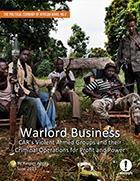
In a new Enough Project report released today, Warlord Business: CAR’s Violent Armed Groups and Their Criminal Operations for Profit and Power, author Kasper Agger examines how the two main armed groups in the Central African Republic (CAR) and their multiple factions make millions of dollars in profits from illicit activities, such as the illicit sale of natural resources, taxation, extortion and the strategic use of killings and violence. Those funds support their operations, and go directly to boost and create wealth for ruthless warlords, senior commanders, and their trading partners.
"Leaders of armed groups that earn hundreds of thousands of dollars and control large areas across CAR have little incentive to lay down their weapons and halt violence. Such leaders must face increased pressure from U.N. peacekeepers on the ground in CAR, and the enablers that work closely with armed groups must face target sanctions, travel bans and asset freezes."
-Kasper Agger, Central Africa-based Field Researcher
The ex-Séléka and Anti-Balaka groups profit from a large illicit minerals trade. Killings, extortion, and other forms of violence are used to control areas with gold and diamonds throughout CAR, and the groups are deeply involved in this high-value trade in several ways. Research presented in this report estimates the total current value of the illegal diamond trade and taxation by armed groups in CAR to be between $3.87 and $5.8 million dollars annually, a sufficient amount in CAR to fund widespread military operations.
The two groups also generate income through illegal taxes and “protection money” from civilians, road travelers, businesses, local organizations, and state institutions. Ex-Séléka factions in particular have set up efficient tax collection practices. Conservative assessments estimate that different factions within the ex-Séléka group, for example, collect $1.5 to $2 million annually from illegal road taxation throughout the areas they control. Meanwhile, Anti-Balaka groups that roam western CAR collect illegal road taxes, extort money from rural villages, and demand sums that range from $600 to $1,000 as a one-time payment for “protection.”
Bringing an end to the crisis in CAR requires preventive strategies that seek to disrupt the sources of finance, combined with punitive measures and sanctions that target individual commanders and the companies and other actors that facilitate the trade.
The report recommends the following five steps to help cut financing for armed groups in CAR:
- The United Nations and the United States should expand targeted sanctions on the networks of actors that trade with and provide finance for armed groups in CAR.
- The United States and other donors such as France, Belgium, and the EU should increase support for the new Special Criminal Court in CAR.
- Establish government control of gold and diamond mining sites through deployment of Central African gendarmes and peacekeeping troops from the UN mission in CAR.
- The Kimberley Process should condition the lifting of restrictions on CAR diamond exports on three commitments to safeguard against conflict diamonds entering the Kimberley Process.
- Counter parallel taxation and highway extortion by armed groups through deployment of Central African gendarmes and peacekeeping troops from the UN mission in CAR to relevant locations.
Editor's Note: “Warlord Business” is the second in a new series of in-depth, field research-driven reports on the dynamics of profit and power fueling war in the Horn, East and Central Africa. Violent kleptocracies dominate the political landscape of this region, leading to protracted conflicts marked by the commission of mass atrocities by state and non-state actors. Enough's Political Economy of African Wars series will focus on the key players in these conflicts, their motivations, how they benefit from the evolving war economies, and what policies might be most effective in changing the calculations of those orchestrating the violence–including both incentives and pressures for peace.

